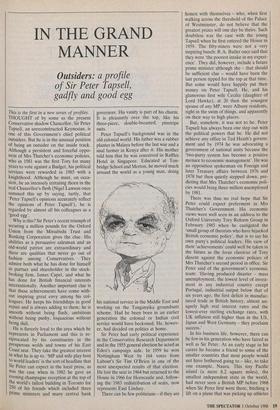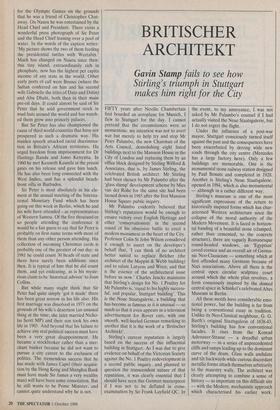IN THE GRAND MANNER
Outsiders: a profile
of Sir Peter Tapsell, gadfly and good egg
This is the first in a new series of profiles. THOUGHT of by some as the present Conservative shadow Chancellor, Sir Peter Tapsell, an unreconstructed Keynesian, is one of this Government's chief political outsiders. But he is in the unusual position of being an outsider on the inside track. Although a persistent and forceful oppo- nent of Mrs Thatcher's economic policies, who in 1981 was the first Tory for many years to vote against a Budget, his political services were rewarded in 1985 with a knighthood. Although he must, on occa- sion, be an intensely irritating thorn in the real Chancellor's flesh (Nigel Lawson once summed this up by saying, tartly, that `Peter Tapsell's opinions accurately reflect the opinions of Peter Tapsell'), he is regarded by almost all his colleagues as a `good egg'.
Why is this? Sir Peter's recent triumph of securing a million pounds for the Oxford Union from the Mitsubishi Trust and Banking Corporation gives the clue. His abilities as a persuasive salesman and an old-world patriot are extraordinary and these are qualities that never go out of fashion among Conservatives. They admire both what he has done for himself as partner and shareholder in the stock- broking firm, James Cape', and what he has done for British financial interests internationally. Another important clue is that these achievements have come with- out inspiring great envy among his col- leagues. He keeps his friendships in good repair and is always adding to them; he is smooth without being flash, ambitious without being pushy, loquacious without being dull.
He is fiercely loyal to the area which he represents in Parliament and this is re- ciprocated by his constituents in the prosperous wolds and towns of his East Coast seat. They take the greatest interest in what he is up to. 'MP and wife play host to world leaders' is the sort of headline that Sir Peter can expect in the local press, as was the case when in 1982 he gave an evening champagne reception at the top of the world's tallest building in Toronto for 250 of his friends which included three Prime ministers and many central bank governors. His vanity is part of his charm. It is pleasantly over the top, like his three-piece, double-breasted, pinstripe suits.
Peter Tapsell's background was in the old colonial world. His father was a rubber planter in Malaya before the last war and a sisal farmer in Kenya after it. His mother told him that he was conceived in Raffles Hotel in Singapore. Educated at Ton- bridge School and Merton, he moved much around the world as a young man, doing his national service in the Middle East and working on the Tanganyika groundnuts scheme. Had he been born in an earlier generation the colonial or Indian civil service would have beckoned. He, howev- er, had decided on politics at home.
Sir Peter had early political experience in the Conservative Research Department and in the 1955 general election he acted as Eden's campaign aide. In 1959 he won Nottingham West by 164 votes from Labour's Sir Tim O'Brien in one of the most unexpected results of that election. He lost the seat in 1964 but returned to the House in 1966 for Horncastle and, follow- ing the 1983 redistribution of seats, now represents East Lindsey.
There can be few politicians — if they are honest with themselves — who, when first walking across the threshold of the Palace of Westminster, do not believe that the greatest prizes will one day be theirs. Such doubtless was the case with the young Tapsell when he first entered the House in 1959. The fifty-niners were not a very inspiring bunch: R.A. Butler once said that they were 'the poorest intake in my experi- ence'. They did, however, include a future prime minister although she — that should be sufficient clue — would have been the last person tipped for the top at that time.
But some would have happily put their money on Peter Tapsell. He, and his glamorous first wife Cecilia (daughter of Lord Hawke), at 20 then the youngest spouse of any MP, were Albany residents, right in the swim of things, and apparently on their way to high places.
But, somehow, it was not to be. Peter Tapsell has always been one step out with the political powers that be. He did not achieve any office in Ted Heath's govern- ment and by 1974 he was advocating a government of national unity because the `two-party system has become a positive menace to economic management'. He was an opposition spokesman on Foreign and later Treasury affairs between 1976 and 1978 but then quietly stepped down, pre- dicting that Mrs Thatcher's economic poli- cies would bring three million unemployed by 1981.
There was thus no real hope that Sir Peter could expect preferment in Mrs Thatcher's Government. His economic views were well seen in an address to the Oxford University Tory Reform Group in February 1985 when he castigated the `small group of theorists who have hijacked British economic policy', that is to say his own party's political leaders. His view of
their 'achievements' could well be taken in the future as the locus classicus of Tory
dissent against the economic policies of Mrs Thatcher's second period in office. Sir Peter said of the government's economic team: 'Having produced disaster — mass unemployment, the lowest level of invest- ment in any industrial country except Portugal, industrial output below that of six years ago, the first deficit in manufac- tured trade in British history, almost un- iquely high real interest rates and the lowest-ever sterling exchange rates, with UK inflation still higher than in the US, Japan and West Germany — they proclaim success.'
In his business life, however, there can be few in his generation who have faired as well as Sir Peter. At an early stage in his career he became a friend to some of the smaller countries that most people would not have bothered going to — like, to take one example, Nauru. This tiny Pacific island (a mere 8.2 square miles), the smallest independent state in the world, had never seen a British MP before 1968: when Sir Peter first went there, hitching a lift on a plane that was picking up athletes for the Olympic Games on the grounds that he was a friend of Christopher Chat- away. On Nauru he was entertained by the Head Chief and President. There exists a wonderful press photograph of Sir Peter and the Head Chief leaning over a pool of water. In the words of the caption writer: `My picture shows the two of them feeding the presidential turtles with Weetabix.' Much has changed on Nauru since then: this tiny island, extraordinarily rich in phosphate, now has the highest per capita income of any state in the world. Other early ports of call were Brunei (where the Sultan conferred on him and his second wife Gabrielle the titles of Dato and Datin) and Abu Dhabi, both then in their main pre-oil days. It could almost be said of Sir Peter that he sold government stock in mud huts around the world and has watch- ed them grow into princely palaces.
But Sir Peter has also championed the cause of third world countries that have not prospered in such a dramatic way. His maiden speech attacked racial discrimina- tion in Britain's African territories. He urged freedom from imprisonment for Dr Hastings Banda and Jomo Kenyatta. In 1960 he met Kenneth Kaunda at the prison gates on his release and gave him lunch. He has also been long connected with the West Indies, and has a splendid beach- front villa in Barbados.
Sir Peter is most absolutely in his ele- ment at the annual meeting of the Interna- tional Monetary Fund which has been going on this week in Berlin, which he and his wife have attended – as representatives of Western Samoa. Of the five thousand or so people attending the conference it would be a fair guess to say that Sir Peter is probably on first-name terms with more of them than any other person attending. His collection of incoming Christmas cards is probably one of the greatest of our day: in 1981 he could count 30 heads Of state and there have surely been additions since then. It is typical of him that he did count them, and yet endearing, as is his myste- rious claim to be 'historical advisor' to Joan Collins.
But while many might think that Sir Peter had quite simply 'got it made' there has been great sorrow in his life also. His first marriage was dissolved in 1971 on the grounds of his wife's desertion (an unusual thing at the time; she later married Nicho- las Scott MP) and their son took his own life in 1985. And beyond that his failure to achieve any real political success must have been a very great disappointment. He became a stockbroker rather than a mer- chant banker because he did not want to pursue a city career to the exclusion of politics. The tremendous success that he has made with James Capel (their acquisi- tion by the Hong Kong and Shanghai Bank must have made Sir James a very wealthy man) will have been some consolation. But he still wants to be Prime Minister, and cannot quite understand why he is not.



































































 Previous page
Previous page